
Letter From The Executive Director
Dr. Robert M. Panoff
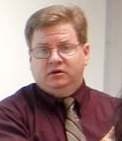
Beginning and Beginning Again
One of the most striking features of the nearly two decades of Shodor's work has been the ability to maintain the same fundamental drive despite so many changes in personnel, funding, and facilities. Since our beginnings in Durham in 1994, Shodor has been one of the few organizations that has been able to stay true to its founding charism, and I believe that is because we have made very good choices to focus on what we do well and to set ourselves to the task of improving math and science education through appropriate uses of computing and communication technologies.
We have the best students learning and building the best materials that we make available to the best teachers through training and support. Our uniqueness remains that we combine student enrichment with faculty enhancement and curriculum development, allowing all three efforts to support and advance each other.
And so we begin again. As you can see from this issue, a major focus of the last few months is to find a safe and appropriate home for Shodor that still allows so many of our students and interns and staff to reach us through public transportation. We have found that home in Golden Belt. Many staff and contractors worked over and above to make sure the new Shodor would meet the needs for many years to come.
I must share with you that the work of Shodor hardly took a break: the day after "moving day" interns were back at work on a variety of projects to improve our web offerings and to continue to explore the new media challenges. As I am sure you realize, mobile devices are all the rage in schools, yet they have little or no effective learning materials besides games and videos that enamor students; Shodor is hard at work to change the landscape with new ways to use our award-winning courseware.
We will be working hard to secure the funding we need to move ahead, and we count on your support. I would be remiss if I didn't ask you once again to remember us in your end-of-year giving if you can. So many of you have been so generous already, but the needs are greater; and so I ask you to help. My heartfelt thanks to each of you and all of you for your help as we strive to transform learning through computational thinking.
All the best,

Bob Panoff
Shodor Moves to Golden Belt!
BY Brittany Coleman, Intern
Previously residing at 300 West Morgan Street (across the street from the Carolina Theatre) since the summer of 2005, Shodor moved to the Golden Belt complex on September 27, 2011. Once an old textile mill, Golden Belt has been transformed into a preeminent center for creative innovations in arts, technology, and much more. In total the campus spans of seven acres. Shodor is currently in an 8,500 square feet custom-built science education facility that perfectly fills Shodor's need to expand its programs and improve facilities. Golden Belt provides Shodor the chance to continue to provide effective STEM education experiences for all levels. It will also give students the opportunity to gain confidence and the skills to be able to attain leadership positions.
As well as the educational benefits, the move also allows Shodor to be accessible by the Durham Area Transit and the Bull City Connector buses. Shodor was offered a space at Research Triangle Park but the offer was kindly declined because Shodor's home is in downtown Durham. Shodor Executive Director, Bob Panoff said, "Shodor was born in Durham, and remaining at the center of such a vibrant, entrepreneurial area was important as we offer students the chance to be a part of a future they learn to build themselves."
Shodor Announces XSEDE Project
BY Hillary Stoker, Staff
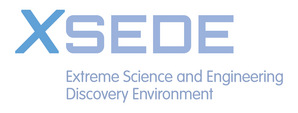
A partnership of 17 institutions, including Shodor, has committed to developing the Extreme Science and Engineering Discovery Environment (XSEDE). XSEDE will be the most advanced, powerful, and robust collection of integrated advanced digital resources and services in the world.
Scientists and engineers use these resources and services-things like supercomputers, collections of data, and new tools-to propel scientific discovery and improve our lives. They are a crucial part of research in fields such as earthquake engineering, materials science, medicine, epidemiology, genomics, astronomy, and biology.
"Enabling scientific discovery through enhanced researcher productivity is our goal, and XSEDE's ultimate reason for being," explained Barry Schneider, a program director in the Office of Cyberinfrastructure at the National Science Foundation (NSF). The NSF will fund the XSEDE project for five years at $121 million.
"For this sort of cyberscience to be truly effective and provide unique insights, it requires a cyberinfrastructure of local computing hardware at sites around the country, advanced supercomputers at larger centers, generally available software packages, and fast networks. Ideally, they should all work together so the researcher can move from local to national resources transparently and easily."
XSEDE will replace and expand the TeraGrid project that started more than a decade ago. More than 10,000 scientists used the TeraGrid to complete thousands of research projects, at no cost to the scientists.
Shodor staff and student interns will be working to bring its computational science education projects to XSEDE, to help develop new curricular resources, to train faculty to approach computational thinking from a parallel perspective, and to build an outreach program capable of attracting more young people into the field by continuing its efforts in workshops, apprenticeships, and internships.
Shodor's role in TeraGrid started with providing digital library expertise for disseminating the best training materials through a new web resource, hpcuniversity.org.
"Once again, Shodor has a great chance to partner with some of the nation's leading institutions to improve STEM (Science, Technology, Engineering, and Mathematics) education at all levels. We will leverage our National Computational Science Institute (NCSI) for faculty and teacher training; our National Science Digital Library (NSDL) pathway, the Computational Science Education Reference Desk (CSERD), for materials development and dissemination; and our Computing MATTERS efforts reaching students in the Triangle area and across North Carolina," said Dr. Robert Panoff, Executive Director of Shodor.
As the only institution in North Carolina selected as a full partner in XSEDE, Shodor will leverage its more than $1M share of the project to bring NC K-12 schools, NC community colleges, the whole UNC system, and other organizations into the project with new opportunities for collaboration.
"Through the XSEDE project Shodor will be doing important work with educators across the country to incorporate computational science and engineering into undergraduate and graduate science, technology, engineering, and mathematics courses across the nation," said Scott Lathrop, the new director of Education and Outreach Services for XSEDE. "This effort will include preparing tomorrow's K-12 teachers to make computational thinking an integral component in their courses. As a result of Shodor's efforts, the nation's workforce will be better prepared to advance scientific discovery and scholarly research."
Initially, XSEDE will support 16 supercomputers across the country. It also includes other specialized digital resources and services to complement these computers. These resources will be expanded throughout the lifetime of the project.
The XSEDE partnership includes: University of Illinois at Urbana-Champaign, Carnegie Mellon University/University of Pittsburgh, University of Texas at Austin, University of Tennessee Knoxville, University of Virginia, Shodor Education Foundation, Southeastern Universities Research Association, University of Chicago, University of California San Diego, Indiana University, Jülich Supercomputing Centre, Purdue University, Cornell University, Ohio State University, University of California Berkeley, Rice University, and the National Center for Atmospheric Research. It is led by the University of Illinois's National Center for Supercomputing Applications.
Where Are They Now, Andrew Fitz Gibbon
BY John Riselvato, Intern
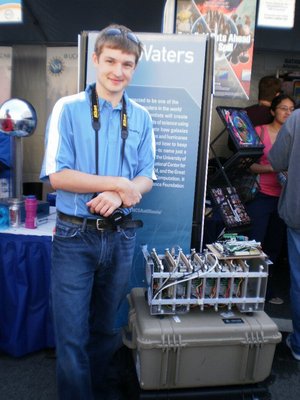
Andrew Fitz Gibbon, known as "Fitz", was a full-time staff member starting in November of 2009. Then in December of 2010, he became a remote part-time staff member until June of 2011.
Fitz accomplished a vast amount during his time at Shodor. He defined the process for committing to and releasing projects, started the development of the JavaScript interactivate project, and worked a significant amount of time on the Blue Waters program. In addition, he spent time parallel programming within National Computational Science Institute. Fitz described his work at Shodor saying, "All of these have been fun and exciting; I'm proud to have worked on each one."
Shortly after his departure from Shodor, Fitz became a Software Development Engineer at Amazon.com in Seattle, Washington. At Amazon, he currently works with a team called "Email Automation". His team is the heart behind automatic emails based on customer behavior. "So if you ever see an email from Amazon saying things like 'looking for an X? How about a Y, too?' then you probably got it from my team", says Fitz. His team uses the technologies of website design, database manipulation, numerical analysis and modeling, and system administration. All of which are common tasks assigned at Shodor.
Fitz explains that Shodor gives you unique opportunities to do more than just improve technical skills. "To really do well in the world, you need more than just technical knowledge (though having it is still important!). You need to be able to work well with others and efficiently and effectively communicate your ideas. Shodor prepares you for that eventuality by putting you up in front of classrooms and encouraging you to interact with your peers." He then jokes about "Who did you help today?" a weekly question asked on reflections. Highlighting the fact that Shodor does prep you for the work force and every day life.
Fitz gives this advice for current day interns at Shodor, "For the programmers among you: Don't let yourself turn into a pure 'code monkey,' sitting in front of a screen hammering out line after line of code." He then suggests, "Instead, take some time to honestly think about what you're working on and don't be afraid to ask if the line of code you're about to write will actually be adding value to the project. More importantly: have fun, work hard, and do interesting things!" Great words to live by in any setting.
Shodor Recognized For Exemplary Workplace Practices
BY Hillary Stoker, Staff
Shodor has been honored with the 2011 Alfred P. Sloan Award for Business Excellence in Workplace Flexibility for its use of flexibility as an effective workplace strategy to increase business and employee success.
This prestigious award, part of the national When Work Works project, recognizes employers of all sizes and types in the Triangle area and across the country.
Workplace flexibility-such as flextime, part-time work and compressed workweeks-has been demonstrated to help businesses remain competitive while also benefiting employees as well.
"Our research consistently finds that employees in effective and flexible workplaces have greater engagement on the job and greater desire to stay with their organization. In addition, they report lower stress levels and better overall health," states Ellen Galinsky, president of Families and Work Institute (FWI), a research think tank on workforce and workplace trends that administers the awards.
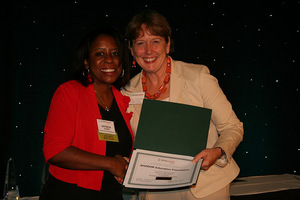
The Sloan Awards are unique for their rigorous, two-step selection process, which involves an evaluation of employers' flexibility programs and practices and a confidential employee survey. All applicants are measured against national norms from FWI's National Study of Employers.
"As a recipient of the 2011 Sloan Award, Shodor ranks in the top 10 employers nationally in terms of its programs, policies and culture for creating an effective and flexible workplace," states Galinsky. "In addition, what makes this honor so special is that their employees have corroborated this, affirming that it is indeed an effective and flexible workplace."
When Work Works is a national project to educate the business community on the value of workplace flexibility by sharing research and promising practices, as well as conducting the annual Sloan Awards. It is an ongoing initiative of Families and Work Institute first funded by the Alfred P. Sloan Foundation. In 2011, the Society for Human Resource Management and FWI formed a ground-breaking, multi-year partnership to grow When Work Works and help businesses become more successful by transforming the way they view and adopt effective and flexible workplaces.
For more information about the When Work Works project and the Alfred P. Sloan Awards for Business Excellence in Workplace Flexibility, visit www.whenworkworks.org.
Matt DesVoigne: A Friendly Farewell
After 9 years of service to Shodor, Matt DesVoigne has left us to pursue becoming a licensed CPA. During his time at Shodor, Matt worked tirelessly to create java applets as part of Project Interactivate, and later, to convert many of those applets to Javascript, the release of which will make Interactivate accessible from mobile devices worldwide. Matt mentored countless interns as a part of Shodor's Mentor Center and taught Programming Concepts to numerous students through Shodor's Project SUCCEED. Joel Coldren, who was hired as an intern being mentored by Matt and was later promoted to a staff position, recalls working with Matt: "I started at Shodor as an intern, with Matt as my mentor, and I learned so much from him. When I was hired as a staff member, I was happy to have Matt as a colleague and friend."
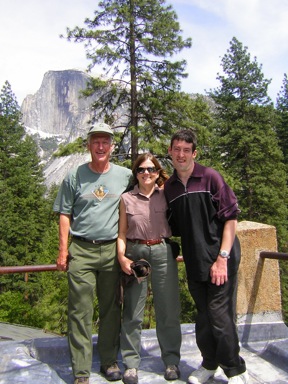
Matt's knowledge is paralleled only by his patience with those less knowledgeable than himself. Patricia Jacobs, Associate Director of Shodor, said, "Matt mentored a lot of students at Shodor in computer programming; some of our best interns learned under his mentorship." Gavin Borg, Matt's former intern enjoyed having Matt as a mentor, observing this of his experiences with Matt: "He is excellent at teaching his mentees how to solve a problem, instead of solving it for them, leaving us with all of the troubleshooting skills needed to succeed on our own." Indeed, Matt has never been too busy to stop and explain things to students, apprentices, interns, and even fellow staff members.
This was not due to Matt's not having work to do. On the contrary, many may be unaware of the extent to which Matt served Shodor. His many responsibilities included maintaining internal websites and contributing to Shodor's finance team as Internal Auditor on top of his vast programming responsibilities. Joyce South, Shodor's bookkeeper, said this about her time working with Matt, "It was a pleasure to work with Matt as Shodor's Internal Auditor. It is a great pleasure to see him on his way to becoming a CPA!"
Matt's new position as a Staff Accountant with Snelson in Sedro Woolley, Washington allows him to build upon his work as Shodor's Internal Auditor. While at Shodor, Matt worked outside of Shodor to complete his Masters in Accounting and pass the CPA exam. Now, after one short year of experience working under a licensed CPA, Matt will be licensed as a CPA himself.
Matt, thank you for your years of hard work to Shodor and the students and teachers that our work reaches. We wish you all the best in this new opportunity!
New Staff Bios:
Aaron Weeden
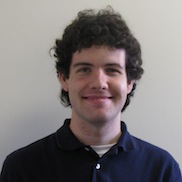
Aaron Weeden is a 2010 graduate of Earlham College in Richmond, Indiana, with a B.A. in Computer Science. He has previously served as an assistant instructor for the National Computational Science Institute and SuperComputing Education Program and is a former Blue Waters Undergraduate Petascale Education Program intern. As a Shodor staff member, he will continue his work with parallelism and education by serving as a parallel computing mentor and Blue Waters module developer.
Levi Diala
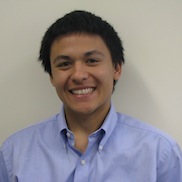
Recent Wake Forest University grad, Levi Diala, will be primarily working on the iApp sales and marketing strategy. Having graduated with a bachelor's degree in mathematics combined with a heavy concentration in the physical sciences, he is able to bridge the gap between Shodor's iApps and the mobile market. Levi brings to the table a wide variety of work experience ranging from customer service relations in the hotel industry to private tutoring in both public and private schools. Levi is extremely excited to join the Shodor family and looks forward to making a positive impact.
Shodor Hosts Grand Opening Party!
On October 31, 2011, Shodor hosted its Grand Opening Party for the new location at The Golden Belt in Durham, NC. There was punch, coffee, and celebratory cake, along with greetings from Shodor's Executive Director Dr. Panoff and Congressman David Price. Shodor staff gave tours of the building, and visitors could observe the interns and apprentices in their new work environment. The party was held between 2PM to 4PM here at Shodor's new location, 807 E. Main St, Suite 7-100 Durham, NC 27701.
Together in Education

Together in Education is Harris Teeter's fundraising program for community schools. When Harris Teeter customers purchase groceries using their VIC card Shodor will receive a percentage of those purchase dollars. Visit http://www.harristeeter.com/community/together_in_education/tie_details.aspx to link your VIC card and contribute to Shodor! Shodor's school code is 5588.